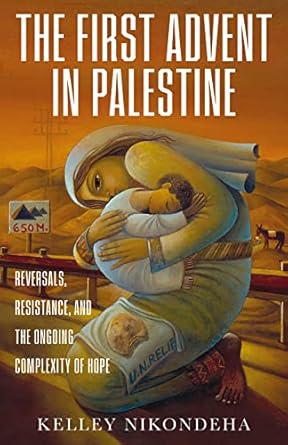
This book was published in 2022. It covers the effect of Jesus’s coming to the poor and downtrodden in Palestine with connections to the present. “Today in Bethlehem, the local economy has suffered under Israeli control with numerous checkpoints. Tourists spend only a few hours rather than days which reduces the money they would inject into the economy.
The author, Kelley Nikondeha, was educated in Communication Studies at Westmont College and also earned a Masters of Divinity from Fuller Theological Seminary. One purpose of the book is to put the biblical Advent stories in a Palestinian context at the time and now.
The setting for Jesus birth was in a time of economic trauma. “We often think of justice as having to do with obeying laws, the meting out of punishment, matters of civil rights, and so forth. But in Scripture, most often it is about economic justice. It is about equitable distribution and returning things (land, labor, livestock, etc.) to their rightful owners.
“Oppression in Caesar’s time took on different forms, beyond military violence. Those working the fields were required to give over half of the bounty to Rome, leaving little for families to survive on. For those with few means, paying tribute to Caesar, taxes to Herod, and tithes to support the temple created debt. Economic loss separated families, caused malnutrition in children, and left many women widowed and vulnerable.”
Luke begins the Christmas story in Luke 2 with economic issues. “Caesar’s census was not about demographic numbers; it was a count of livestock, crops, and people who could pay taxes. It was an inventory of wealth that allowed the empire to further spread the burden of taxation. A census was always bad news for the poor, never lightening their load. From time to time, though, a census was known to ignite rebellion.”
In the reading there are corrective interpretations of the Luke 2 story, in particular the idea of no room in the inn. “Due to poor interpretation of Luke’s text, Bethlehem and her innkeepers have historically been burdened with a bad reputation regarding their lack of hospitality for the Holy Family”.
“They were welcomed by family. However, we are told “there was no room for them in the inn,” a phrase better understood as “there was no space for them in the usual guest room of the home.” Room was made for everyone, even if it was a corner here or a stable there. As long as everyone was under the same roof, it didn’t matter if they were in a private nook or on a straw mat next to the goats.”
How can we respond to the issue of economic justice in our own time? “A true resistance worthy of the first advent would be a move into durable justice work the rest of the year. Imagine giving to a local food bank during Advent and then working on advocacy related to food insecurity and childhood hunger the rest of the year. Imagine learning about the realities around school lunch programs—how many need free or reduced-price lunches in your local schools; whether quality meals are offered—and organizing your community to improve what is on offer to kids. Imagine spending the year tackling the policies that create food deserts, which keep many neighborhoods undernourished. But there are many other possibilities: affordable housing and tenants’ rights, fair wages, accessible healthcare and medications, or indigenous land rights.
“Advent reaches across the generations, always pushing us to embody God’s peace in today’s troubled times. We recognize the signature of advent not in Herod but in the true king, Jesus. Generations brought us to the first advent in Bethlehem, as Matthew demonstrates. And generations will keep advent and seek advent’s promise of peace in seasons to come.”
